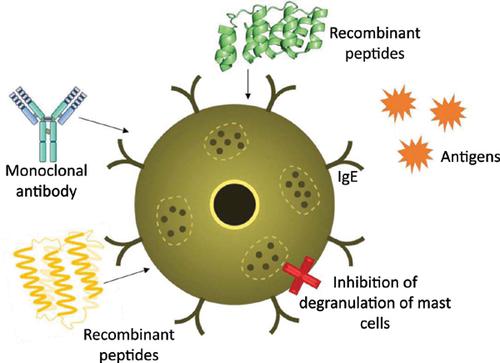Current Protein & Peptide Science ( IF 2.8 ) Pub Date : 2020-07-31 , DOI: 10.2174/1389203721666200511094717 Huda Fatima Rajani 1 , Solmaz Shahidi 2 , Mohammad Mahmoudi Gomari 1

|
With an increase in atopic cases and owing to a significant role of mast cells in type I hypersensitivity, a therapeutic need to inhibit degranulation of mast cells has risen. Mast cells are notorious for IgE-mediated allergic response. Advancements have allowed researchers to improve clinical outcomes of already available therapies. Engineered peptides and antibodies can be easily manipulated to attain desired characteristics as per the biological environment. A number of these molecules are designed to target mast cells in order to regulate the release of histamine and other mediators, thereby controlling type I hypersensitivity response. The aim of this review paper is to highlight some of the significant molecules designed for the purpose.
中文翻译:

蛋白质和抗体工程-抑制肥大细胞脱粒和I型超敏反应。
随着特应性病例的增加以及由于肥大细胞在I型超敏反应中的重要作用,抑制肥大细胞脱粒的治疗需求增加了。肥大细胞因IgE介导的过敏反应而臭名昭著。研究人员的进步使研究人员能够改善现有疗法的临床效果。根据生物学环境,可以容易地操纵工程改造的肽和抗体以获得所需的特性。这些分子中的许多分子被设计成靶向肥大细胞,以便调节组胺和其他介质的释放,从而控制I型超敏反应。本文的目的是强调一些为此目的而设计的重要分子。


























 京公网安备 11010802027423号
京公网安备 11010802027423号